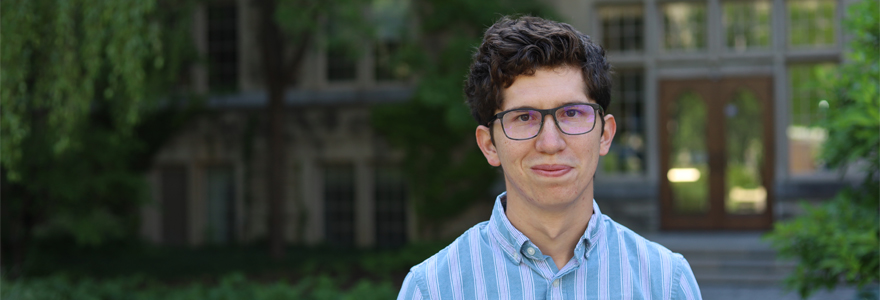News and Updates
Contact
Faculty of Social Science
Social Science Centre
Room 9438
Western University
T. 519-661-2053
F. 519-661-3868
E. social-science@uwo.ca
Indigenous studies course focuses on “resilience and resistance”
September 26, 2022
Story and photo by Rob Rombouts
As students start university, many of them have had more media and educational exposure to Indigenous issues than in the past, and for Cody Groat that presents both an opportunity and a challenge.
Groat, an assistant professor in Western’s Department of History and the Indigenous Studies program, is teaching a first-year Introduction to Indigenous Studies course.
Groat is Kanyen’kehaka (Mohawk) and a band member of the Six Nations of the Grand River. Growing up in London and Ingersoll, Ont., he wasn’t personally exposed to any content related to Indigenous people at school.
“There was zero content related to Indigenous people in high school,” said Groat.
There was more opportunity for learning in university, but Groat has been surprised by how much this year’s incoming students already know.
“I’m shocked to see the base knowledge in high school,” he said. “They are also coming in with more opinions.” Those views are likely formed through representations in the media, which often focus only on particular aspects of the Indigenous experience, he said.
Relying on works by Indigenous scholars, including professor Eve Tuck from the University of Toronto, the first-year course centralizes Indigenous resiliency in order to challenge victimization narratives. Under this approach, lessons about residential schools centre on Indigenous family structures, teachings on land-based learning, and language revitalization in response to assimilation strategies of the past, Groat said.
“Media coverage tends to be about trauma and victimization, not about resilience and resistance. I am trying to show a continuity in culture and resistance to state systems.”
Most students in the course are non-Indigenous, and Groat said he is also bringing a viewpoint that was formed outside of his Indigenous community.
“I will be bringing in how my experience influenced my perspectives.”
While students may have more introductory knowledge about Indigenous issues, some may not have much understanding, Groat said.
“We will use that opportunity to discuss why that might be the case. If they don’t have some knowledge, it’s not bad. We will assess how and why that may have come to be.”
The course work encourages students to think about how their understanding develops and deepens over the term. They will write an introductory paper outlining their initial knowledge, and by the end of the term will review and reconsider their ideas.
Groat’s influence extends beyond the classroom in creating a supportive environment for Indigenous students at Western.
His father, Bill, was a survivor of the Sixties Scoop, and his grandparents were survivors of the Mohawk Institute Residential School. In his later life, Bill became a public speaker, sharing his experiences in the child welfare system and working to ensure the records of similar experiences were publicly accessible. Bill passed away earlier this year, and in his memory his children funded the Bill Groat Memorial Award, which provides financial support to an Indigenous student attending Western.
Observing National Day for Truth and Reconciliation
On Sept. 30, Western will observe National Day for Truth and Reconciliation, a federal holiday declared last year in response to the Calls to Action of the Truth and Reconciliation Commission of Canada.
Students, staff and faculty are encouraged to reflect on the current relationship between Canada and Indigenous Peoples, as well as on the shared history that informs that relationship.
“We are all Treaty people, and that means that everyone at Western has a responsibility to advance Truth and Reconciliation. I hope the entire campus will join in the observance of this day, because it is for all of us – not just Indigenous people,” said Christy Bressette, associate vice-president (Indigenous Initiatives).
A variety of campus events will take place on Sept. 30 and the days leading up to it. A full schedule, together with educational information related to Truth and Reconciliation, can be found on the Office of Indigenous Initiatives website.

